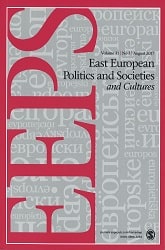Memory, Party Politics, and Post-Transition Space: The Case of Poland
Memory, Party Politics, and Post-Transition Space: The Case of Poland
Author(s): Kate KoryckiSubject(s): Government/Political systems, Sociology of Politics, Politics of History/Memory, Politics and Identity
Published by: SAGE Publications Ltd
Keywords: collective memory; programmatic identity; political identity; Poland;
Summary/Abstract: In this work I analyze and interpret Polish political field as a field of memory. I make three claims. First, I claim that programmatic identities of Polish political parties are weak. Despite this weakness political competition remains fierce, because parties fashion enduring political identities. I identify three mainstream political identities of political actors in Poland, given by their temporal orientation and their judgment of communism. Second, I claim that the field of the political competition predicated on the turn to the past and on moral opprobrium is the particular achievement of the party that captured political power in Poland in 2015. Similarly to its 2005 electoral success, the party narrated the country’s main problem as communist state-capture. It claimed that (former-) communists and their post-dissident allies captured political, material, and symbolic levers of power. This way of presenting the problem polarized the field, casting political opponents as essential enemies, and casting the narrators as country’s saviors. Third, this achievement was possible because the party narrated communism as essentially and existentially anti-Polish: it presented it as equal to Nazism, it made it foreign, and it made it coincidental with Jewishness. It then launched such discursive “weapon” against its present-day opponents.
Journal: East European Politics and Societies
- Issue Year: 31/2017
- Issue No: 03
- Page Range: 518-544
- Page Count: 27
- Language: English
- Content File-PDF

